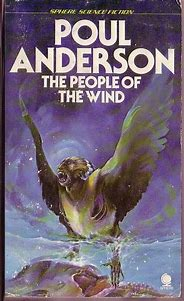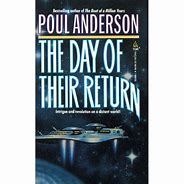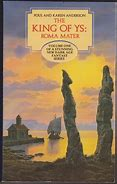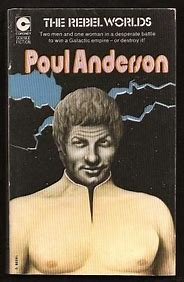Saturday, 30 September 2023
Betrayal
Friday, 29 September 2023
Other Texts
Also in The Secret Families, a supporter of a dictator says that society needs a strong hand. That rang a bell. Merseians are autocratic and ruled by "Hands." However, the Hand of a Vach is (not meant to be) a hand on the Vach. That would be a major difference of meaning.
Finally, for now, we learn a great deal more about intelligence agents' "tradecraft" from Gardner's characters than from Dominic Flandry, James Bond or Matt Helm. Different authors cast light on each other. To Poul Anderson readers, I recommend John Gardner, Ian Fleming and Donald Hamilton.
Explaining The Subcultures
Subsequent waves of immigrants were not integrated and did not benefit from high tech but adopted alternative lifestyles to which they became attached or, in the case of the tinerans, addicted. Does that sufficiently explain Aenean cultural separatism? We want to accept tinerans, Riverfolk and Orcans but need an adequate rationalization for their diversity. As Bruce Pennington, cover artist, commented, the book has:
Thursday, 28 September 2023
Aenean Subcultures
The Day Of Their Return, 5.
After Sam Hedin come the nomads or tinerans:
"The Aenean intellectual community took little serious interest in the undercultures on its own planet." (p. 108)
Bad. However, the text continues:
"Despite the centuries, Dido still posed too many enigmas which were more fascinating and professionally rewarding." (idid.)
Well, ok. You can't do everything. Nevertheless, scientists and academics specialize. Any university, like the one in Nova Roma which attracts out-system students, should consist of departments addressing xenobiology, sociology, anthropology etc. If the subcultures have been ignored, then someone is going to see a wide-open field for research with potential for many research assistants, Ph.D.'s, publications and academic careers. Ivar Frederiksen, already a hereditary member of the University, should encourage Aenean Subculture Studies when he becomes Firstman of Ilion especially since he has learned by direct experience that the tinerans need both understanding and assistance.
Sam Hedin's Soggy Logic
The Day Of Their Return, 4.
I am reluctant to let go of Sam Hedin just as I was to let go of Chunderban Desai. Everyone tries to think consistently, i.e., logically, but that does not prevent them from:
What Sam Hedin Said
The Day Of Their Return, 4.
People accept, reinterpret or reject received ideas. Ideas interact, conflict and change especially in times of upheaval.
Sam Hedin:
is well-educated, well-travelled and hard-headed;
draws a cross and mutters as he passes an Ancient ruin;
asks where the Ancients came from and where they went;
thinks it unreasonable to suppose that all of them died on Aeneas and elsewhere;
quotes many who wonder (my emphasis) if they didn't go onward and out;
speaks as if the Elders will return;
then says that he doesn't know;
used to go to church but not think about such things;
now asks if so many can be wrong (Comment: yes);
adds that many hope (my emphasis) that the Elders will return, bearing the Word of God;
asks whether the exiled rebel leader could have gone their way;
has heard rumours of a new prophet;
does think that human experience and the stellar universe can't be for nothing;
again asks whether, if God is preparing a new revelation, it should not be through a better and wiser chosen race - who would be preceded by a prophet.
Wednesday, 27 September 2023
The Eastern Edge Of Ilion
The Day Of Their Return, 4.
(Tomorrow will be taken up with a funeral, then an evening meeting, so there might not be much blogging. There was a guy that I had expected to meet at the funeral but I read his obituary today.)
We realize that Aeneas is not just an empty stage where Poul Anderson's characters strut and fret their hour but an imaginatively constructed planetary environment:
there are canals, marshes and salt lakes on the Antonine (former) Seabed;
westerly winds blow moisture from the Seabed onto the eastern edge of the continent of Ilion where there is "...actual rain two or three times a year." (p. 100);
also, the Wildfoss River helps to maintain a water table that supplies a few wells;
consequently, generations of the Hedin family have been able to farm and ranch;
their settlement has a windbreak of Aenean delphi and rahab, Terrestrial oak and acacia, Llynathawrian rasmin and Ythrian hammerbranch;
their flowerbeds have to be extra-planetary because no flowers evolved on Aeneas.
Think about all that detail, then contemplate not just the Hedins but an entire population living in Ilion and in other parts of Aeneas.
Desai And Ivar
The Day Of Their Return.
It is with a heavy heart that I turn from that pedestrian plodder, Chunderban Desai, to the charismatic criminal, Ivar Frederiksen, but we must follow the author's narrative. Ivar is the kind of fugitive action hero who is passed from pillar to post, in Ivar's case, from Windhome to the Hedin Freehold to the tinerans to the Riverfolk to the Orcans and finally, since he runs out of alternatives, to Desai and the Imperium. These formative experiences will make Ivar eventually an effective and empathetic Firstman of Ilion. In particular, he will aim to free the tinerans from their addiction to the telepathic parasites which in turn might explain the fate of the Ancients who were also the Chereionites. The Technic History is a single long narrative although its diverse details might obscure certain larger scale connections. In The Game of Empire, Axor investigates the Ancients while Tachwyr wonders about Aycharaych and, as in real history, not every question is answered. As Tolkien wrote about The Lord of the Rings, it is too short. However, Tolkien's Trilogy seems rushed - the characters depart on a long journey and, almost immediately, reach their destination. By contrast, a very great deal of time elapses between the opening Technic History instalment, "The Saturn Game," and the conclusion, "Starfog." Everything else that we read about, League, Empire etc, comes and goes between these end points.
Fictional Locations
The Day Of Their Return.
I said before that the entire action of this novel takes place on the surface of a single planet, Aeneas. Sean Brooks pointed out that this was not quite true because, on just one occasion, Chunderban Desai reminisces about a conversation between himself and his Merseian opposite number elsewhere. On rereading the relevant passage, I am not quite sure where. After the negotiations that had ended the Jihannath crisis, Desai and Uldwyr had been in a restaurant that catered to many species where:
"...the meal was an inspired combination of human and Merseian dishes." (3, p. 83)
Desai reminisces on Aeneas but his reminiscence is about a restaurant on another planet. One fictional setting is imposed on another. When characters recount their experiences to each other, we have to bear in mind both the setting where the characters converse and the settings of their recounted experiences. Meanwhile, each reader is sitting in his own real world setting. We pass between real and fictional locations. Yesterday, after visiting Andrea in his three-dimensional warren overlooking Morecambe Bay, I walked past Morecambe Police Station where a camera crew was set up to film a scene for The Bay TV series. Fictional events were about to happen. There is a Lancashire Police Service but no West Lancashire Police Service.
Tuesday, 26 September 2023
Desai
The Day Of Their Return, 3.
Desai is our guy.
He invokes an interesting range of deities:
"God knows the present needs more of me than I have to give." (p. 85)
"God!" (ibid.)
"Krishna!" (p. 93)
"Siva have mercy." (p. 98)
He is a linking character. In an otherwise atrocious Batman film, one newly introduced character was a business contact of Bruce Wayne (the Batman), the employer of Selina Kyle (the Catwoman) and the political backer of Oswald Cobblepot (the Penguin). Similarly, Desai:
Barsoom
See also:
Ghosts And Aeneas plus combox
Aeneas: Planet And People plus combox
"...the sun was half again as far way..." (p. 88)
- on Aeneas as on Earth or Ramanujan.
Aeneas, with deserts, and Dido, with jungles, are like old sf versions of Mars and Venus with no Asteroid Belt or Earth between them.
For other references to Barsoom on the current blog, see also here. (Scroll down.)
Aeneas: Planet And People
The Day Of Their Return.
An arid environment where it rarely rains and never snows.
University, Landfolk, Townfolk, subcultures, the industrial Web, centuries-old Nova Roma, tri-cameral Parliament.
Subcultures: tinerans, riverfolk, Orcans, Highlanders (whom we never see).
Ancient remnants, e.g., a wall in the University; a ruin in the Dreary; the Arena, used by Orcans.
See Aeneas.
Ghosts On Aeneas
The Day Of Their Return.
Ivar Frederiksen thinks that he sees lights move across the dead sea bottom:
"...lanterns on ghost ships, sailing an ocean that vanished three million years ago...." (2, p. 80)
Chunderban Desai sees:
"Afar in the desert, a dust storm went like a ghost." (3, p. 99)
Poul Anderson gives us a feel for the Aenean environment. This is what Aeneans see and also what they sometimes imagine. There will be ghost stories especially since the ghosts can be those of the Ancients who departed this planet three million years ago. Aenean ghost stories could be fictions within the fiction of the Technic History.
Monday, 25 September 2023
Dominic Flandry Highlights
(i) Flandry and Kossara are concealed among the Merseians who march on the Dennitzan Parliament - the idea of Flandry on a political march, let alone one composed of Merseians!
(ii) In the Cathedral of St Clement, a priest chants behind a screen while the future St. Kossara lies in state and her bereaved fiance, Flandry, effectively prays to the future saint, requesting a sign...
(iii) The italicized concluding passage that becomes a prayer:
Technic History Highlights
"How To Be Ethnic In One Easy Lesson," introducing Adzel and the Earth of the Solar Commonwealth;
"Lodestar," introducing Coya Conyon and Mirkheim, disclosing the main conflict in Technic civilization and featuring the dramatic confrontation between van Rijn and Falkayn;
Mirkheim, a good novel, a good political novel and a good sf novel;
Hloch's main introduction to The Earth Book of Stormgate;
the opening paragraph of The People of the Wind, VI, introducing the Avalonian city of Centauri which is the setting for a meeting between Tabitha Falkayn and Christopher Holm.
Desai And Uldwyr
The Day Of Their Return, 3.
One of my favourite passages in Poul Anderson's Technic History is Chunderban Desai's after dinner conversation with his opposite number, Uldwyr. The passage informs, or reminds, us that the Merseian has a "...crocodilian tail which counterbalanced his big, forward-leaning body..." (p. 83) but omits to add that he would have been squatting on this tail while conversing with the seated Desai.
Uldwyr refers to:
Destiny's Garden
Ambush And Windhome
The Day Of Their Return, 2.
Ivar Frederiksen and his band of Aenean guerrillas wait to ambush an Imperial patrol. When the marines arrive, we are told that:
"They were human..." (p. 77)
They might not have been, of course. The guerrillas are all human because only human beings had colonized Aeneas.
Defeated, Ivar sneaks back to Windhome, "...the ancestral seat of the Firstman of Ilion." (p. 79) We remember that, in The Rebel Worlds, Fleet Admiral Hugh McCormac, Firstman and Imperial pretender, rode into Windhome with his sons. Now, McCormac's nephew-in-law, Ivar Frederiksen, Firstling (heir):
"...stumbled to press the scanner plate." (p. 79)
We are seeing the same place from a very different point of view. The Day Of Their Return is an unexpected interruption to the Dominic Flandry series and also a welcome addition to the Technic History.
Sunday, 24 September 2023
On Aeneas
The Day Of Their Return, 2.
"East of Windhome the country rolled low for a while, then lifted in the Hesperian Hills." (p. 76)
The planet, Aeneas, had appeared in a single passage in The Rebel Worlds. Now Poul Anderson develops Aeneas in detail. In fact, I think that The Day Of Their Return is the only Technic History novel to be set entirely on the surface of a single planet. In this chapter, it is early summer. Imported oak and cedar are intensely green but rasmin is purple. We are not told the colour of the overarching delphi. The grass-equivalent land cover, fire trava, is not green but onyx tinged with red and yellow. In Anderson's novels, we are always aware that another planetary environment would not look like Earth.
By day, the fire trava smells of flint and sparks. At night, it curls up into a springy mat. Ivar Frederiksen is not lying merely on a differently coloured grass. Born to this environment, he is not reflecting on Aenean plant life and indeed has problems of an entirely different order.
Thor And Hugh Valland
See Dream Country plus combox.
OK. I got it wrong about Thor so here's the deal. Valland tells young Wenli that:
Species In Technic Civilization
The Day Of Their Return, 2.
In this chapter, we are inside Ivar Frederiksen's point of view and therefore inside a worldview where Terrans are the enemy. That will not last in this novel but it does elsewhere. Near the end of The People of the Wind, an Avalonian Ythrian dies doing what he wants to do, killing Terrans - but "Terrans" do not include human Avalonians and the Terran forces include a Cynthian who dies in the attack. Ivar will consider seeking support from Ythrians and Merseians. We know that there are human beings in the Domain of Ythri. We will learn that there are human beings in the Merseian Roidhunate and also beings of Merseian species, although now called either ychani or zmayi, on Dennitza in the Terran Empire.
Will different intelligent species ever interact like different Terrestrial nationalities? I think that we will be far too alien to each other for that - as did the British sf writer, Bob Shaw, who never recounted conversations between human beings and aliens.
Dream Country
Gods withdrawn or gods still active: either seems appropriate but are they not mutually incompatible? No way. Neil Gaiman's Death of the Endless explains that mythologies take a long tome to die and that they linger on in a dream country affecting everyone. That is a relief. In an intergalactic future, Poul Anderson's Hugh Valland tells a child about Thor....
Enemies Of Terra
The Day Of Their Return, 2.
So far in the Technic History, we have seen the Terran Empire:
Saturday, 23 September 2023
Oneness And Morning Star
The text begins with a quotation: Job iv, 12-16.
Chapter 1, on pp. 75-76, occupies less than one page of text and is scriptural in tone, beginning:
"On the third day he arose, and ascended again to the light." (p. 75)
The viewpoint character, Jaan, reflects:
"To be man is to be radiance." (ibid.)
It is or at least it can be but we are to learn that Jaan's "...resurrection..." (p. 76) is a deception.
The chapter ends:
"Above them paled Dido, the morning star." (p. 76)
This is the first textual indication that the novel is set not only in Poul Anderson's Technic History but also, more specifically, in the Virgilian System in Sector Alpha Crucis. Jaan must be on Aeneas where Dido is the morning star. And, since, according to Jaan, the morning star is:
"...the planet of the First Chosen..." (p. 75)
- those First Chosen are the tripartite Didonians. We know, if we are reading the Technic History consecutively, that the Didonians practise oneness. Now Jaan's inner voice, Caruith, speaks of mankind being:
"...received into Oneness..." (p. 76)
In Chapter 2, beginning on p. 76, an opening reference to Windhome and the introduction of a viewpoint character with the surname, Frederiksen, confirm that the action is on Aeneas.
Pacifism And Reformism
God And Hugh McCormac
The Rebel Worlds.
We know from "The Problem of Pain" and The Day Of Their Return that there are convinced Christians on Aeneas.
Hugh McCormac reflects:
Before And After
Memories
I am having the familiar experience of remembering but not being able to find a passage near the end of A Circus of Hells. Djana remembers the time when when she and Flandry had hunted for wealth on Wayland. There is a similar passage near the end of The Rebel Worlds:
Friday, 22 September 2023
The Technic History In Six Omnibus Volumes
Abrams, Flandry And Havelock
Didonian Learning
The Rebel Worlds, CHAPTER TWELVE.
Guardian of North Gate does not understand pidgin because:
"...only heesh's noga had been in Cave Discoverer." (p. 481)
However, all of Lightning Struck The Houses's units have linked with those of Cave Discoverer in order:
"...to gain some command of pidgin." (p. 483)
A Didonian entity remembers heesh's own experiences but also receives memories from heesh's three units. The novel begins with a linkage between -
the noga of:
(Im)Plausibility
Donald Hamilton like many other authors wrote thrillers set in the twentieth century so that their readers were familiar with the general background, e.g., the international conflicts of the 1960s, whereas Flandry operates on exotic extra-solar planets where his author has invested considerable ingenuity in devising alien environments, biologies and psychologies. As Brian Aldiss commented, science fiction authors work hard for their living.
Thursday, 21 September 2023
Death On Dido
The Rebel Worlds, CHAPTER TWELVE.
Cave Discoverer's ruka is killed in battle. Cave Discoverer ceases to exist. Many Thoughts and Master of Songs now cannot exist. Cave Discoverer will no longer travel to the annual fair. Therefore, almost certainly, Raft Farer will no longer exist - unless some other entity takes the former Cave Discoverer's noga to the fair, thus enabling it again to link with the other two units that, together with it, form Raft Farer.
Have Cave Discoverer, Many Thoughts, Master of Songs and (probably) Raft Farer, these four entities, all "died"? All that has physically died here is a single organism constituting one Didonian unit of multiple entities.
I only work here.
The Complexities Of Didonians
The Rebel Worlds.
The bird-like krippos are also viviparous.
Cave Discoverer and Many Thoughts can never meet because they share two units although they share memories from those units.
Unless my Maths are wrong, the nine units of three entities can be reassembled into twenty-six other entities. However, a Didonian "communion" (society) pragmatically deploys the appropriate units to spend most of their time within outstanding entities, like Cave Discoverer for exploration, Many Thoughts for wisdom or Master of Songs for music. These three entities share the same noga and ruka, differing only in their krippo. Their noga and ruka are unlikely to spend much time in less talented entities. While Cave Discoverer accompanies Flandry's group across the mountains, neither Many Thoughts nor Master of Songs can be formed back in Thunderstone. Temporary entities must know that they are temporary and not object. Altruism within a communion is so natural that it has not been conceptualized.
When Cave Discoverer travels to an annual fair, his noga links with a ruka from one place and a krippo from another to form Raft Farer. Thus, Raft Farer exists only annually and only as long as three entities from different communions remain able to visit that fair.
Experiencing the transience of their consciousnesses, the Didonians can hardly conceptualize individual entities as immortal souls.
The Weirdest Species
The Rebel Worlds, CHAPTER ELEVEN.
Flandry to Kathryn:
"'My business has put me in contact with various breeds. I remain convinced we humans are the weirdest of the lot; but your Didonians come close.'" (p. 473)
Why should human beings be the weirdest? Editor John Campbell wanted them to be not only distinctive but also superior. To avoid conflict with his editor, Asimov invented the humans only galaxy. Anderson's multi-species Technic History is infinitely richer. But I think that any reflective species would think itself the weirdest merely because it knows itself better, from the inside out. Flandry has mere "contact" with many others.
Maybe Aycharaych is the being to ask.?
Wednesday, 20 September 2023
Didonian Entities
The Rebel Worlds, CHAPTER ELEVEN.
Three entities, Cave Discoverer, Harvest Fetcher and Smith, accompany Flandry's group over the mountain. This means that, for the time being, Many Thoughts does not exist, also that heesh will not come back into existence if either of the units that heesh shares with Cave Discoverer dies or is killed during the journey. The units of the three entities accompanying the group can recombine as Iron Miner, Guardian of North Gate, Lightning Struck The House or other entities. They need a change and need to maintain the different entities and they also practice oneness ritualistically. Separating, the krippos go aloft as scouts while rukas gather berries. They can perform such routine tasks but can also respond to any need for reunion. Thus, the units alternate between animal consciousness and participation in rational consciousness but in different individual entities. What can this be like?
Resources
The Rebel Worlds, CHAPTER TEN, pp. 468-469.
Snelund lists what bureaucrats and functionaries do:
The Importance Of Satan
The Rebel Worlds, CHAPTER TEN.
The wealth-generating planet, Satan, was discovered in the Polesotechnic League period. In the later Imperial period:
"The defense of Satan became a major reason to garrison and colonize Sector Alpha Crucis." (p. 462)
A reason to colonize the sector: this is an important connection between the two periods.
When waging civil war against the Emperor, Admiral McCormac reasons:
the destruction of the Satanic factories would be an unacceptable economic loss for the Imperium;
therefore, the loyalists will probably avoid the planet;
therefore, Satan will probably be a safe sanctuary for his own rebel forces.
But, if nevertheless the loyalists do attack, then McCormac will certainly use Satan as a shield. Whether destroyed or only held by the rebels, Satanic products will be denied to the enemy.
More About Didonians
The Rebel Worlds, CHAPTER NINE.
Every human being welcomes unconsciousness at night, confident that, other things being equal, s/he will regain consciousness in the morning. Of course, we will die sometime and that could be in our sleep.
A Didonian entity ceases to exist when heesh's three units end their linkage. Presumably, the entity expects to be reassembled sometime but that will not happen if even one of the three units dies in the meantime.
The entity designated Cave Discoverer is an explorer and adventurer who shares two units with the wisest, Many Thoughts:
"'Many Thoughts gets the vigor and boldness of the same noga and ruka, but heesh's journeys are of the spirit....'" (p. 460)
When Many Thoughts' krippo replaces Cave Discoverer's, Many Thoughts takes a minute to absorb the information conveyed by the noga and ruka that the two entities share. Then Kathryn has to repeat whatever information went away with the departing krippo.
The loss of either the noga or the ruka would mean that neither Cave Discoverer nor Many Thoughts could be reassembled although much of their knowledge would be preserved in the surviving units.
Primary education comprises two-way linkages between mature and immature units. Didonians cannot have any concept of privacy. Poul Anderson invites us to imagine a fundamentally different form of consciousness.
Trade Unions And Governments
Cons
Do they have sf in the Solar Commonwealth? Do they imagine faster hyperdrive to other galaxies? Would that count as sf? They could have alternative histories like what would have happened if there had been a nuclear exchange during the Chaos? Maybe they do not have contemporary sf but value speculative fiction from earlier centuries.
I mention this because there is a serial killers convention, complete with panel discussions, guest of honour speech etc, in Neil Gaiman's The Sandman. In haste. About to visit Andrea.
Tuesday, 19 September 2023
Fantasy And SF
Blish's Satan becomes God. Neil Gaiman's Lucifer retires and, shortly thereafter, Gaiman's God withdraws to be replaced by His granddaughter, Lucifer's niece. Anderson's, Lewis' and Heinlein's God and Adversary remain in place which is what we except of them. Some traditions are usually respected.
Gaiman writes no sf but matches the others in fantasy. However, we value differences as well as similarities between authors. These particular authors display different degrees of depth and diversity.
Two Inns
An Anderson collection with Old Phoenix-based introductions to original stories could have featured characters from different series each introducing an new addition to his or her particular narrative. Thus, such a collection would belong not to one series but to all and would unite them into a mega-series.
Accessible Texts
The accessibility of a text to a reader is first a function of which language it is written in. Obviously. A Chinese or Japanese text is impenetrable to most of us here. However, there are several other factors. How long ago was the text written? Is it poetry, prose, drama or graphic story-telling? How dense or complicated is it? How archaic, obscure or specialized is its vocabulary? To which genre does it belong? What literary conventions or references does it assume familiarity with? An English text can be effectively unreadable. We have become familiar with the cliches that have accumulated within sf but imagine if the only sf that we had ever read was the pre-cliched texts of Wells and Verne.
Monday, 18 September 2023
Tripartite Symbiosis
The Rebel Worlds, CHAPTER NINE.
A single Didonian intelligence is a temporary symbiosis between a rhinoceros-like noga, a bird-like krippo and an ape-like ruka except that none of these animals is very like the Terrestrial organism to which it is compared and they should look as alien as possible in any cinematic CGI. A noga is smooth and blue. A ruka runs on all four limbs and has disproportionately large chest, shoulders and arms, bigger than a man's. The krippo has a head that swells grotesquely backward. The CGI should follow Anderson's descriptions in detail and should loose any association with familiar African animals as much as possible. When linked, the noga grunts, the krippo trills and the ruka generates various sounds. Together, they speak. Kathryn replies in pidgin.
Sunday, 17 September 2023
Connections Between Several Authors
(i) Robert Heinlein, Isaac Asimov, James Blish and Poul Anderson were the Campbell future historians.
(ii) Heinlein, Anderson and Blish also wrote fantasy.
(iii) Anderson and Blish also wrote historical fiction.
(iv) Anderson's Psychotechnic History was modelled on Heinlein's Future History.
(v) Anderson's Operation Chaos was a conceptual development from Heinlein's Magic, Inc.
(vi) Anderson and JRR Tolkien published Norse-based fantasy at the same time.
(vii) CS Lewis' Ransom Trilogy, Volume III, That Hideous Strength, quotes a detail from Tolkien's not-yet-published Middle Earth History.
(viii) Blish's After Such Knowledge Trilogy, Volume III, A Case of Conscience, quotes from Lewis' Ransom Trilogy.
(ix) After Such Knowledge, Volume IIa, Black Easter, and IIb, The Day After Judgement, quote from Lewis' The Screwtape Letters.
(x) George MacDonald's Phantastes inspired CS Lewis, Lewis Carroll and others.
(xi) Lewis and MacDonald converse fictitiously in Lewis' The Great Divorce.
(xii) Lewis' Narnia and MacDonald's Lilith influenced Neil Gaiman's The Sandman.
(xiv) Heinlein's description of a gathering of demons in Hell in Magic, Inc. influenced the graphic depiction of such a gathering in The Sandman.













































